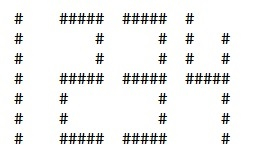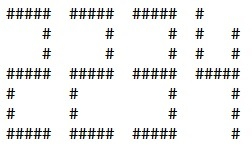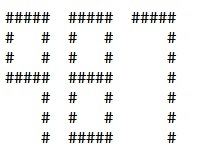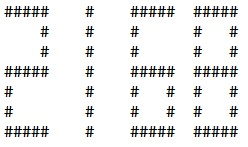Maison >développement back-end >C++ >Le programme C reçoit un numéro et l'imprime en gros caractères
Le programme C reçoit un numéro et l'imprime en gros caractères
- PHPzavant
- 2023-09-01 12:01:04725parcourir
Étant donné un nombre n sous la forme d'une chaîne ; la tâche consiste à imprimer le grand nombre suivant en utilisant la notation hachée.
Comme nous avons fourni le numéro "1234"
La représentation du numéro ci-dessous devrait être -

De même, nous voulons que notre solution imprime -
Exemple
Input: n[] = {“2234”}
Output:
Input: n[] = {“987”}
Output:
Approche que nous utiliserons pour résoudre le problème donné -
- Entrez jusqu'à 4 chiffres dans la chaîne.
- Créez un tableau où chaque nombre correspond au modèle de grand nombre que nous voulons.
- Parcourez la chaîne et imprimez chaque numéro un par un.
Algorithme
Start
Step 1 -> Define Height as 7
Step 2 -> Define W 8
Step 3 -> In function int large(char num[])
Declare variables i, j, k
Set char zero[H][W]={" ##### ", // H=0
" # # ",
" # # ",
" # # ",
" # # ",
" # # ",
" ##### "},
Set one[H][W]={" # ",
" # ",
" # ",
" # ",
" # ",
" # ",
" # "},
Set two[H][W]={ " ##### ",
" # ",
" # ",
" ##### ",
" # ",
" # ",
" ##### "},
Set three[H][W]={" ##### ",
" # ",
" # ",
" ##### ",
" # ",
" # ",
" ##### "},
Set four[H][W]={" # ",
" # # ",
" # # ",
" ##### ",
" # ",
" # ",
" # "},
Set five[H][W]={" ##### ",
" # ",
" # ",
" ##### ",
" # ",
" # ",
" ##### "},
Set six[H][W]={ " ##### ",
" # ",
" # ",
" ##### ",
" # # ",
" # # ",
" ##### "},
Set seven[H][W]={" ##### ",
" # ",
" # ",
" # ",
" # ",
" # ",
" # "},
Set eight[H][W]={" ##### ",
" # # ",
" # # ",
" ##### ",
" # # ",
" # # ",
" ##### "},
Set nine[H][W]={" ##### ",
" # # ",
" # # ",
" ##### ",
" # ",
" # ",
" # "}
If strlen(num) > 10
Print ”You must enter a number upto 10 digits”
Else
Print new line
Set k=1
Set j=0
While k <= 7
Loop For i=0 and i<strlen(num) and i++
If num[i] == '0' then,
Print zero[j]
Else If num[i] == '1’ then,
Print one[j]
Else If num[i] == '2' then,
Print two[j]
Else If num[i] == '3' then,
Print three[j]
Else If num[i] == '4' then,
Print four[j]
Else If num[i] == '5' then,
Print five[j]
Else If num[i] == '6' then,
Print six[j]
Else If num[i] == '7' then,
Print seven[j]
Else If (num[i] == '8')
Print eight[j]
Else If (num[i] == '9')
Print nine[j]
End For
Print newline
Increment k by 1
Increment j by 1
End While
End Else
Step 4 -> Declare int main()
Declare and initialize input char n[] = {"2168"}
Call function large(n)
StopExemple
#include<stdio.h>
#include<string.h>
#include<stdlib.h>
#define H 7
#define W 8
int large(char num[]) {
int i, j, k;
// declaring char 2D arrays and initializing
// with hash-printed digits
char zero[H][W]={" ##### ", // H=0
" # # ", // H=1
" # # ", // H=2
" # # ", // H=3
" # # ", // H=4
" # # ", // H=5
" ##### "},// H=6
one[H][W]={" # ",
" # ",
" # ",
" # ",
" # ",
" # ",
" # "},
two[H][W]={ " ##### ",
" # ",
" # ",
" ##### ",
" # ",
" # ",
" ##### "},
three[H][W]={" ##### ",
" # ",
" # ",
" ##### ",
" # ",
" # ",
" ##### "},
four[H][W]={" # ",
" # # ",
" # # ",
" ##### ",
" # ",
" # ",
" # "},
five[H][W]={" ##### ",
" # ",
" # ",
" ##### ",
" # ",
" # ",
" ##### "},
six[H][W]={ " ##### ",
" # ",
" # ",
" ##### ",
" # # ",
" # # ",
" ##### "},
seven[H][W]={" ##### ",
" # ",
" # ",
" # ",
" # ",
" # ",
" # "},
eight[H][W]={" ##### ",
" # # ",
" # # ",
" ##### ",
" # # ",
" # # ",
" ##### "},
nine[H][W]={" ##### ",
" # # ",
" # # ",
" ##### ",
" # ",
" # ",
" # "};
if (strlen(num) > 10)
printf("</p><p>You must enter a number upto 10 digits.</p><p>Try again!</p><p>");
else {
printf("</p><p>");
k=1;
j=0; //controls H of each digit
while (k <= 7) //controls height {
for (i=0; i<strlen(num); i++) //reads each digit {
if (num[i] == '0')
printf("%s", zero[j]);
else if (num[i] == '1')
printf("%s", one[j]);
else if (num[i] == '2')
printf("%s", two[j]);
else if (num[i] == '3')
printf("%s", three[j]);
else if (num[i] == '4')
printf("%s", four[j]);
else if (num[i] == '5')
printf("%s", five[j]);
else if (num[i] == '6')
printf("%s", six[j]);
else if (num[i] == '7')
printf("%s", seven[j]);
else if (num[i] == '8')
printf("%s", eight[j]);
else if (num[i] == '9')
printf("%s", nine[j]);
}
printf("</p><p>");
k++;
j++;
}
}
return 1;
}
//main fucntion
int main() {
char n[] = {"2168"};
large(n);
return 0;
}Sortie

Ce qui précède est le contenu détaillé de. pour plus d'informations, suivez d'autres articles connexes sur le site Web de PHP en chinois!
Déclaration:
Cet article est reproduit dans:. en cas de violation, veuillez contacter admin@php.cn Supprimer

